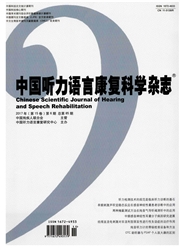

 中文摘要:
中文摘要:
目的探讨GJB2基因致病突变杂合携带的语前聋患者在核心启动子区域是否存在影响功能的碱基突变。方法从前期收集的1750例耳聋患者中选取20例GJB2基因致病突变杂合携带的语前感音神经性耳聋患者和20例GJB2基因无致病突变的语前聋患者,同时选取22例听力表型正常人作为对照。利用其外周血白细胞基因组DNA作模板,运用聚合酶链反应(PCR)的方法对耳聋患者和对照组GJB2基因第一外显子和核心启动子区域进行扩增,扩增产物纯化后进行测序,运用DNAStar软件对测序结果进行生物信息学分析、比对。结果40例患者在GJB2基因第一外显子区未发现突变。20例GJB2致病突变杂合携带者中12例患者在转录起始位点上游-229位点存在T〉C碱基改变,呈杂合携带形式;20例GJB2基因无致病突变的耳聋患者中7D]在转录起始位点上游-229位点存在T〉C碱基改变,呈杂合携带形式,7例在-229位点存在T〉C纯合携带形式,22例听力正常对照者10例在转录起始位点上游-229位点存在T〉C碱基改变,呈杂合携带形式,3NJ在转录起始位点上游-229位点存在T〉C纯合携带形式。结论本研究发现的GJB2基因转录起始位点上游出现的-229位点T〉C碱基改变不是致病突变,目前GJB2致病基因杂合携带的耳聋患者中GJB2基因与耳聋的关系尚难确定。
 英文摘要:
英文摘要:
objective To explore the pathologic mutation possibility in the basal promoter of GJB2 gene among prelingually hearing-impaired patients with heterozygous pathologic GJB2 mutations. Methods Twenty prelingually hearing-impaired patients with heterozygous pathologic mutations of GJB2 gene and twenty without pathologic mutations of GJB2 gene were selected from 1750 hearing-impaired patients. The control group was comprised of 22 non-related normal- hearing subjects.Genomic DNA was extracted from the peripheral white blood cells of the patients and controls, and the basal promoter and exon 1 of GJB2 gene were amplified by polymerase chain reaction (PCR). The amplicons were purified and directly sequenced in two directions. The sequencing results were analyzed with DANStar software. Rosutts There was no mutation in exon 1 of the 40 patients. The heterozygous c.-229T〉C mutation was identified in 12 of the 20 patients with beterozygous pathologic mutation of GJB2 gene. The heterozygous c.-229T〉C mutation was identified in 7 patients and the homozygous c.-229T〉C mutation was identified in 7 of the 20 patients without pathologic mutations of GJB2 gene. In the normal-hearing control group, 10 subjects were heterozygotes for the c.-229T〉C mutation and 3 were homozygotes for the c.-229T〉C mutation. Conclusion The c.-229T〉C mutation in the basal promoter is not a pathologic mutation. It is still difficult to determine the relationship between hearing impairment and GJB2 gene in the patients with heterozygous pathologic mutation of GJB2 gene.
 同期刊论文项目
同期刊论文项目
 同项目期刊论文
同项目期刊论文
 期刊信息
期刊信息
